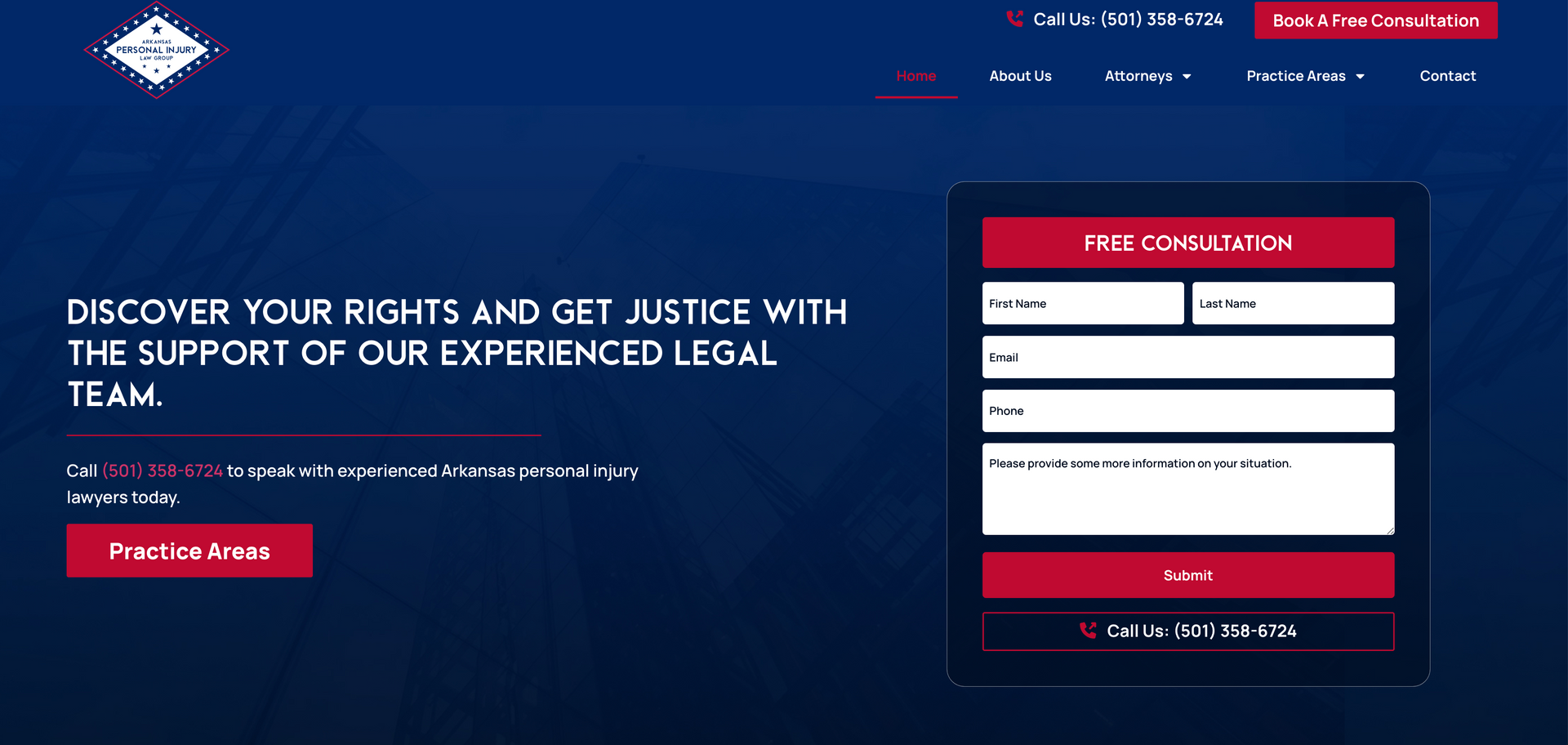Comprehensive Guide to Law Firm Digital Marketing
Comprehensive Guide to Law Firm Digital Marketing
In today's digital age, law firms need a strong online presence to attract and retain clients. At Scale and Sword Advertising, we provide law firms with the tools to enhance their visibility, engage with potential clients, and ultimately drive growth. This article delves into the various aspects of law firm digital marketing, offering a comprehensive overview for law firms looking to optimize their digital strategies.
Understanding Law Firm Digital Marketing
Digital marketing for law firms involves the use of online channels and strategies to promote legal services, enhance brand awareness, and attract clients. Key components include search engine optimization (SEO), content marketing, pay-per-click (PPC) advertising, social media marketing, email marketing, and online reputation management. Each component plays a vital role in creating a robust digital marketing strategy.
Search Engine Optimization (SEO)
SEO is the process of optimizing a website to rank higher in search engine results pages (SERPs). For law firms, SEO is crucial for attracting organic traffic from potential clients searching for legal services. At Scale and Sword Advertising, we excel in implementing key SEO strategies, including:
- Keyword Research: Identifying relevant keywords that potential clients use to search for legal services. Keywords should be specific to practice areas, geographic locations, and common legal questions. For example, a family law firm in Chicago might target keywords like "Chicago family lawyer," "divorce attorney Chicago," and "child custody lawyer in Chicago."
- On-Page SEO: Optimizing individual web pages to rank higher. This includes using target keywords in titles, headers, meta descriptions, and throughout the content. Also, ensuring the website is mobile-friendly, fast-loading, and secure. For instance, a blog post on "What to Expect During a Divorce in Illinois" should include keywords like "Illinois divorce process" and "divorce lawyer in Illinois."
- Content Creation: Developing high-quality, informative content that addresses the needs and concerns of potential clients. Blog posts, articles, and FAQ pages can help improve search rankings and establish the law firm as an authority in its field. For example, a personal injury law firm can publish articles on "How to File a Personal Injury Claim in Texas" or "Common Mistakes to Avoid After a Car Accident."
- Link Building: Acquiring backlinks from reputable websites to improve the site's authority and search rankings. This can be achieved through guest blogging, partnerships, and creating shareable content. For example, partnering with local news websites to publish legal advice columns or guest posts on reputable legal blogs.
Content Marketing
Content marketing involves creating and distributing valuable content to attract and engage a target audience. For law firms, content marketing can help demonstrate expertise, build trust, and drive traffic to the website. Scale and Sword Advertising utilizes key content marketing strategies, including:
- Blogging: Regularly publishing blog posts on legal topics relevant to the firm's practice areas. This can include case studies, legal updates, how-to guides, and commentary on current legal issues. For example, a criminal defense firm might blog about "What to Do If You're Arrested in New York" or "Understanding Your Rights During a Police Stop."
- Ebooks and Whitepapers: Creating in-depth resources that provide detailed information on complex legal topics. These can be offered as free downloads in exchange for contact information, helping to generate leads. For example, an employment law firm could offer a whitepaper on "Navigating Workplace Discrimination Claims."
- Video Content: Producing videos that explain legal concepts, provide insights into the legal process, and showcase the firm's expertise. Videos can be shared on the firm's website, YouTube, and social media platforms. For example, a series of videos on "Understanding Your Rights After a Car Accident" can attract viewers and potential clients.
- Webinars and Online Seminars: Hosting live or recorded webinars on legal topics. These events can attract potential clients and provide an opportunity for interaction and engagement. For example, a webinar on "Estate Planning Essentials for Young Families" can attract a specific target audience.
Pay-Per-Click (PPC) Advertising
PPC advertising involves paying for ads that appear on search engines and other platforms. For law firms, PPC can drive targeted traffic to the website and generate leads. Scale and Sword Advertising employs key PPC strategies, including:
- Google Ads: Running search ads on Google to target potential clients searching for legal services. Ads should be targeted based on keywords, geographic location, and user intent. For example, targeting keywords like "best criminal defense lawyer near me" with location-specific ads.
- Display Advertising: Placing banner ads on relevant websites to increase brand visibility. Display ads can be targeted based on demographics, interests, and browsing behavior. For example, placing ads on websites frequented by business owners for a corporate law firm.
- Remarketing: Targeting users who have previously visited the firm's website with ads to encourage them to return and take action. For example, showing ads for "Free Consultation with a Personal Injury Lawyer" to users who visited the consultation page but didn't book an appointment.
- Social Media Ads: Running ads on social media platforms like Facebook, LinkedIn, and Instagram to reach a broader audience. These ads can be targeted based on demographics, interests, and behaviors. For example, targeting ads for "Experienced Family Lawyer" to individuals recently engaged or going through a divorce.
Social Media Marketing
Social media marketing involves using social media platforms to promote the law firm's services, engage with potential clients, and build a community. Scale and Sword Advertising excels in key social media strategies, including:
- Platform Selection: Choosing the right platforms based on the firm's target audience. LinkedIn is ideal for B2B marketing, while Facebook and Instagram can reach a broader audience. For example, using LinkedIn to share thought leadership articles for a business law firm.
- Content Sharing: Regularly posting content that is informative, engaging, and relevant to the firm's practice areas. This can include blog posts, videos, infographics, and case studies. For example, sharing a client testimonial video on Facebook or an infographic on "Steps to Take After a Workplace Injury" on Instagram.
- Engagement: Interacting with followers by responding to comments, answering questions, and participating in discussions. This helps build relationships and trust with potential clients. For example, hosting a live Q&A session on Facebook to answer common legal questions.
- Paid Social Media Advertising: Running targeted ads to increase visibility and drive traffic to the firm's website. Social media ads can be highly targeted based on user demographics, interests, and behaviors. For example, promoting a free legal consultation offer to users who fit the firm's ideal client profile.
Email Marketing
Email marketing involves sending targeted email campaigns to a list of subscribers. For law firms, email marketing can help nurture leads, build relationships, and keep clients informed. Scale and Sword Advertising uses key email marketing strategies, including:
- List Building: Growing an email list by offering valuable content, such as ebooks, whitepapers, and newsletters, in exchange for contact information. For example, offering a free guide on "Steps to Take After a Car Accident" in exchange for an email address.
- Segmentation: Dividing the email list into segments based on factors like practice area interest, geographic location, and client status. This allows for more personalized and relevant email campaigns. For example, sending tailored emails to clients interested in family law versus criminal defense.
- Content: Sending regular emails that provide valuable information, updates, and insights. This can include newsletters, legal updates, case studies, and event invitations. For example, a monthly newsletter featuring recent blog posts, upcoming webinars, and legal news.
- Automation: Using email automation tools to send targeted emails based on user behavior, such as website visits, form submissions, and email opens. Automated email sequences can nurture leads and guide them through the sales funnel. For example, sending a series of emails explaining the legal process after a user downloads a personal injury guide.
Online Reputation Management
Online reputation management involves monitoring and influencing the law firm's online presence. For law firms, maintaining a positive online reputation is crucial for attracting and retaining clients. Scale and Sword Advertising offers key reputation management strategies, including:
- Review Management: Encouraging satisfied clients to leave positive reviews on platforms like Google, Yelp, and Avvo. Responding to reviews, both positive and negative, in a professional manner. For example, sending follow-up emails to clients requesting reviews and providing direct links to review sites.
- Social Media Monitoring: Keeping an eye on social media mentions and conversations about the firm. Responding to comments and addressing any negative feedback promptly. For example, using tools like Hootsuite to track mentions and engage with users in real-time.
- Content Creation: Producing positive content that highlights the firm's successes, client testimonials, and community involvement. This can help counteract any negative content and improve the firm's online image. For example, publishing success stories and client testimonials on the firm's blog and social media channels.
- Crisis Management: Having a plan in place to address any potential crises or negative publicity. This includes monitoring online mentions, responding quickly, and communicating transparently. For example, preparing a crisis communication plan and training staff on how to handle negative publicity.
Analytics and Reporting
Analytics and reporting involve tracking and measuring the performance of digital marketing efforts. For law firms, this is essential for understanding what strategies are working and where improvements are needed. Scale and Sword Advertising provides key analytics and reporting strategies, including:
- Website Analytics: Using tools like Google Analytics to track website traffic, user behavior, and conversions. Analyzing metrics such as page views, bounce rate, and average session duration. For example, tracking the performance of a new blog post and making adjustments based on user engagement.
- SEO Analytics: Monitoring search engine rankings, organic traffic, and keyword performance. Tools like Google Search Console and SEMrush can provide valuable insights. For example, tracking keyword rankings for "personal injury lawyer in Los Angeles" and adjusting SEO strategies accordingly.
- PPC Analytics: Tracking the performance of PPC campaigns, including click-through rates, cost-per-click, and conversion rates. Adjusting campaigns based on performance data. For example, optimizing ad copy and targeting to improve the ROI of a Google Ads campaign.
- Social Media Analytics: Measuring social media engagement, reach, and follower growth. Tools like Hootsuite and Sprout Social can help track performance across multiple platforms. For example, analyzing the engagement rate of different types of posts to determine what resonates most with the audience.
- Email Marketing Analytics: Analyzing email open rates, click-through rates, and conversion rates. Using this data to optimize future email campaigns. For example, testing different subject lines and call-to-action buttons to improve email performance.
Legal and Ethical Considerations
Digital marketing for law firms must adhere to legal and ethical standards. Ensuring compliance with these standards is crucial for maintaining credibility and avoiding legal issues. Scale and Sword Advertising ensures compliance with key considerations, including:
- Advertising Regulations: Complying with state bar advertising rules and guidelines. This includes accurate representations of the firm's services and avoiding misleading claims. For example, ensuring that all marketing materials are reviewed for compliance with the American Bar Association's guidelines.
- Client Confidentiality: Protecting client information and ensuring that any client-related content is shared with consent. For example, obtaining written consent before sharing client testimonials or case studies.
- Privacy Policies: Implementing and communicating a clear privacy policy that outlines how the firm collects, uses, and protects user data. For example, ensuring that the firm's website includes a comprehensive privacy policy and is compliant with GDPR and other privacy regulations.
- Transparency: Being transparent about the firm's services, fees, and any potential conflicts of interest. For example, providing clear and detailed information about the firm's billing practices and any potential conflicts of interest on the website.
Leveraging Technology
Technology plays a vital role in enhancing digital marketing efforts for law firms. Utilizing the right tools and platforms can streamline processes and improve results. Scale and Sword Advertising leverages key technologies, including:
- Marketing Automation: Using tools like HubSpot and Marketo to automate marketing tasks, such as email campaigns, social media posting, and lead nurturing. For example, setting up automated email sequences to nurture leads and convert them into clients.
- Customer Relationship Management (CRM): Implementing a CRM system like Clio to manage client relationships, track interactions, and streamline workflows. For example, using a CRM to track client communications and ensure timely follow-ups.
- Content Management Systems (CMS): Using a CMS like WordPress or Drupal to manage website content and ensure it is optimized for search engines. For example, using a CMS to regularly update the firm's blog and ensure it is SEO-friendly.
- Data Analytics Tools: Leveraging tools like Google Analytics, SEMrush, and Moz to track performance, analyze data, and make informed decisions. For example, using analytics tools to track the success of a PPC campaign and adjust strategies based on performance data.
Case Studies and Success Stories
Showcasing case studies and success stories can demonstrate the effectiveness of Scale and Sword Advertising's digital marketing strategies.
- Client Background: PI client, located in Miami, FL, specializes in personal injury law.
- Challenges: Not enough leads generation.
- Solutions: PPC and SEO
- Results: As a result of these efforts, the firm saw a 70% increase in monthly leads within six months. The quality of leads improved, resulting in a higher conversion rate. Organic traffic increased by 45% due to effective SEO strategies, and the website ranked on the first page for multiple local personal injury keywords. The strategic approach focusing on SEO and Google Ads led to substantial increases in leads and online visibility, demonstrating the effectiveness of targeted digital marketing efforts for personal injury law firms.
Conclusion
Law firm digital marketing is a multifaceted discipline that requires a strategic approach to achieve success. By leveraging SEO, content marketing, PPC advertising, social media marketing, email marketing, online reputation management, analytics, and technology, Scale and Sword Advertising helps law firms enhance their online presence and achieve their marketing goals. Trust our expertise to navigate the complexities of digital marketing and drive your law firm's growth in the digital landscape.
By focusing on specific, actionable strategies and demonstrating a deep understanding of the legal industry, Scale and Sword Advertising positions itself as a trusted partner for law firms looking to succeed in digital marketing.
Let’s talk about your project
Fill in the form or call to set up a meeting at 302 285 9806






